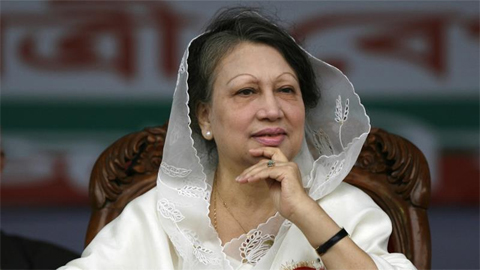 DHAKA: A Bangladesh court yesterday doubled a jail term for imprisoned opposition leader Khaleda Zia from five to 10 years for what her supporters say are trumped-up corruption charges. The decision came a day after Zia, arch-rival of Prime Minister Sheikh Hasina, was handed a separate seven-year term for other graft charges. The prosecution told AFP that Zia, 73, will serve the sentences concurrently. Her lawyers said the former prime minister would appeal the latest ruling in Bangladesh's highest court. The Bangladesh Nationalist Party (BNP), which Zia has led from Dhaka Central Jail since being incarcerated in February, protested against the decision and vowed nationwide demonstrations later.
DHAKA: A Bangladesh court yesterday doubled a jail term for imprisoned opposition leader Khaleda Zia from five to 10 years for what her supporters say are trumped-up corruption charges. The decision came a day after Zia, arch-rival of Prime Minister Sheikh Hasina, was handed a separate seven-year term for other graft charges. The prosecution told AFP that Zia, 73, will serve the sentences concurrently. Her lawyers said the former prime minister would appeal the latest ruling in Bangladesh's highest court. The Bangladesh Nationalist Party (BNP), which Zia has led from Dhaka Central Jail since being incarcerated in February, protested against the decision and vowed nationwide demonstrations later.
The February corruption verdict triggered clashes between police and thousands of BNP loyalists. The prosecution had demanded Zia serve more time for embezzling orphanage money - an appeal a higher court granted yesterday. "The high court has upheld the lower court verdict and raised the jail sentence from original five years to 10 years," anti-corruption commission prosecutor Khurshid A Khan told AFP. Zia has always denied the charges, and many others she faces, saying she is being pursued in court to prevent her challenging Hasina in a general election slated for December.
Zia boycotted the 2014 general election which Hasina won, sparking violence across the Muslim-majority democracy of 160 million. The latest court ruling deals a crushing blow to the BNP and its embattled leader, who is running out of time to appeal the courts to let her run. "She cannot contest the elections unless the conviction is set aside by a higher court," Bangladesh's attorney general Mahbubey Alam said. Her lawyer, Sanaullah Mia, said Zia questioned whether her appeal would get a fair hearing in the Supreme Court. "She had already expressed fear that she would not receive justice, and then this happens. There is no justice," he said.
Health concerns
This latest court ruling comes as the independence of Bangladesh's judiciary is under question. In a recently published memoir, a former chief justice alleged he was forced into exile last year after disagreeing with Bangladesh's powerful intelligence services over a case. Another judge, who also lives in exile in Malaysia, made similar remarks in a television interview, alleging he was threatened to hand down a guilty verdict against Zia's son Tarique Rahman. Rahman was jailed for life in absentia this month over a 2004 grenade attack on a Hasina political rally. He lives in exile in London. In recent months, Zia's health has deteriorated inside the abandoned 19th-century jail where she is the only inmate. A physician said she was suffering from diabetes and that arthritis had rendered her left hand useless.
Lawyers for Zia, widow of assassinated military dictator Ziaur Rahman, have accused the government of putting her health at risk by refusing her specialized care in prison. The latest verdict throws up more hurdles for the opposition, which says 4,000 of its supporters have been arrested since September in a pre-election crackdown. Hasina's rule has been marred by allegations of stifling dissent. Critics of her administration, including a prominent photojournalist and lawyers and journalists, have been detained since major anti-government protests in August brought hundreds of thousands to the streets.
But the ruling party has agreed to hold talks on the looming election with an opposition alliance that includes the BNP, a minister announced hours after Monday's verdict was announced. The ruling Awami League had previously rejected such talks. The Jatiya Oikya Front (United National Front) has demanded that the election be held under an interim neutral government. But Awami League deputy chief and influential minister, Obaidul Quader, said his side had agreed to talks "without giving in to anyone's pressure". The talks are set to be held tomorrow._ AFP









